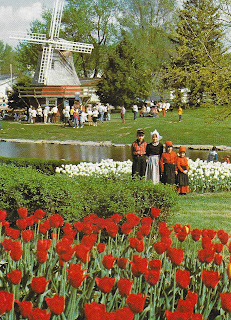May Day
The ancient Druids, Phoenicians, and Romans wanted Mother Earth to bring forth a fruitful season and drive away evil spirits responsible for the cold, darkness, barrenness, and illness.
In Rome, the feast of Floralia lasted five days.
The Druids were sun-worshippers; to honor their god, they lit a fire on May 1st. It is called Beltun, which was the Celtic word for May Day. After a second fire was lit, the men and cattle were driven to symbolize good health and fertility.
The Maypole comes from pagan worship of the mighty tree. The people believed supernatural beings lived in the tree, and as it produced buds, life, and growth were renewed.
Early Britons held that the night before May 1st was a dreadful night of evil spirits which rode through the air. To get rid of the evil, fires were lit around the village. On May 1st, at dawn, carolers left a wreath of green boughs and flowers at each doorstep. The good fairies would then bless the house, and the family would put out bowls of milk as a thank-you to the fairies.
The girls believed if they washed their faces in morning dew in the month of May, they would have beautiful complexions and lose their freckles.
The Maypole was brought into the village by ox cart and decked with flowers. A pretty girl was chosen to be the Queen of the May and sat on a throne. People danced around her, and bells were rung to awaken the soil and to make the seeds and roots come to life. The winding of ribbons around the Maypole came later.
The immigrants from England, Whales, and Ireland brought the idea of May celebrations to our New England. The custom began by decorating small baskets with crepe paper and bows. Fresh flowers and candy filled the baskets, which were hung on doors. The giver would run away after ringing the doorbell.
Native American Indians celebrated spring by dancing around a pole fastened by leather thongs to stand for the sun's rays.
Jingles began in ancient Rome and Greece. Examples are "Come out, dear sun," or "Rain, rain, go to Spain."
In some ancient Danish villages, the whole town would stay in the forest all night playing and gathering greenery on the eve before May Day. On the next day, contests of Nordic games were played to drive away winter, and spring would triumph. Sometimes the games got out of hand, and the contestants entered into hard brutal fighting. What a way to bring in spring.
Will April showers bring us May flowers? Do you know any upcoming May Day Festivals? I so please share with us.





Love this time of year
ReplyDelete